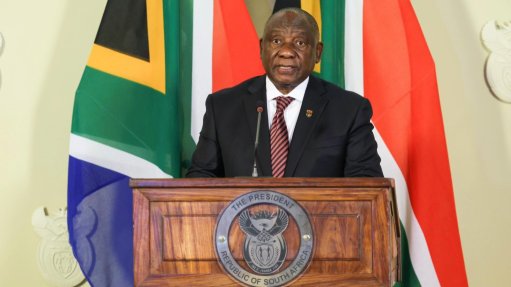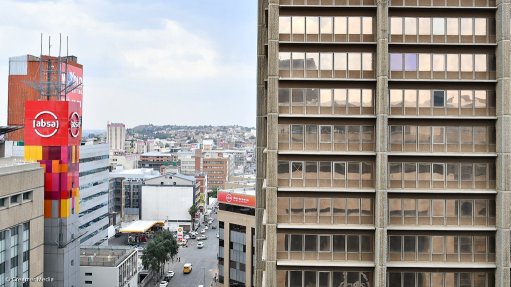Africa needs all hands on deck to meet 2030 energy goals
To achieve universal energy access by 2030, Africa will need a range of technologies and policy changes that open national grids to private participation, enable the establishment of microgrids and move to regional power trading and power pools, energy industry experts highlighted during a webinar this week.
The 'Energy in Africa' think-tank webinar, hosted by consulting and market research multinational Frost & Sullivan Africa on July 14, debated the opportunities, challenges and dynamics in the energy industry in Africa.
Africa is hugely diverse in social, cultural, economic and power source terms, with North Africa mainly relying on natural gas for power generation, Central Africa using hydropower, East Africa using geothermal and renewable energy, and Southern Africa predominantly using coal for power generation, said Frost & Sullivan Africa energy and power consultant Patrick Prestele.
However, as a whole, Africa still relies on fossil fuels for the majority of its electricity generation, albeit concentrated in North Africa and South Africa.
"Given the recent investment trends and patterns since COP26, we are going to see a change in investments in the coming decade. Renewables will take the biggest share of investments and is expected to be Africa's main source of electricity by 2030, mainly solar photovoltaic, wind and hydropower," he said.
However, Africa also has a different challenge, as energy demand is set to double by 2030 and the majority of industry experts believe renewables alone will not meet demand, he added.
Across Africa, 600-million people lack access to electricity, while 900-million rely on biomass for heating and cooking.
To address basic socioeconomic requirements and support the economic development objectives of the region, Africa’s energy requirements will have to be met through a combination of feedstock sources, including natural gas and renewable technologies.
However, parallel investments into renewable energy infrastructure are required to enable Africa’s transition to greener technologies. In addition, an equal amount of investment is required to develop Africa’s transmission and distribution networks to fully achieve energy access targets.
This holds massive opportunity for private-sector stakeholders to get involved in the energy and power sector if the policy and regulatory frameworks are conducive and consistently enforced.
Africa is home to nearly 20% of the world's population, but receives only 5% of global energy investments currently, with only ten African countries responsible for 90% of this investment in the energy sector, with South Africa attracting nearly 40% of the investments, said Prestele.
"To overcome the funding challenge, African utilities must take drastic measures to balance their income sheets and attract more private sector participation. African utilities are still largely vertically integrated, across generation, transmission and distribution divisions. Where private participation is allowed, it is mainly in the generation space," he said.
"Globally, where private participation is allowed in transmission and distribution, private operators significantly outperform on technology and commercial bases compared with State-owned operators," he highlighted.
African governments need to work with utilities to lower regulatory barriers, especially in the transmission and distribution space. Importantly, significant upgrade and expansion of the energy industry, and especially of transmission and distribution infrastructure, is the only way for Africa, in combination with the private sector investment, to provide affordable and reliable electricity to its population, said Prestele.
There is a direct correlation between the availability and affordability of electricity and economic growth, and economic growth will have an impact on industrialisation, said financial services firm Standard Bank Group natural resources, business and commercial clients executive head Berrie de Jager.
"When we look at renewables in isolation, then certain challenges arise, such as intermittancy. If a country sees investment in productive capacity, such as in mining, this would pose a challenge purely from a renewables perspective.
"However, most countries in Africa, and the world, have adopted some just transition strategy to transition to a better energy mix, which will eventually include renewables.
“As countries, and Africa, build a better energy mix, and gradually add renewables to the grid to supplement existing supply with new renewable energy, we can get to an environment that accelerates industrialisation through a proper mix of energy sources," he said.
A better energy mix will also bring costs down and, if achieved, will attract further investment, which would accelerate the process, he added.
Africa contributes very little to the global carbon footprint, with some statistics estimating that, if each person in Africa tripled energy consumption, this would only increase global carbon emissions by 1%, noted market intelligence firm Welligence Energy Analytics VP and Africa research head Derek Boulware.
"We are in a transition period and cannot simply turn off power from oil, gas and fossil fuel sources, including to meet baseload power demands. We will continue to need traditional oil and gas, with gas able to play the role as a bridging fuel and may be the answer to the interim period as Africa transitions," he said.
Africa has many opportunities to take advantage of, even if based only on the technologies available compared with 10 to 15 years ago, and these can be deployed in more areas, including those that cannot feasibly be reached by the grid, said Prestele.
More personal residences and businesses are using standalone systems, which is a good trend, but, once regions reach a certain level of development, minigrids can be integrated into the central grid.
"But, we will need new business models for that to incentivise personal and small-scale consumption, as well as find new ways to generate electricity and then sell it back to balance under- and oversupply and thereby further develop the grids," he said.
However, Africa does need vertical unbundling of the power sector to lay the foundation for a diverse energy network and then take advantage of the opportunities, secure investments and use new technologies and financing options available to develop electricity grids across the continent, he said.
Historically, utilities have been primarily generation-driven, while transmission and distribution were not thought of as profit centres, highlighted De Jager.
"However, with unbundling initiatives, the champions seem to be the transmission entities. And, when we consider forces such as decentralisation, then the historical model is turned upside down, and consumers are able to focus on the use of distributed energy, including on their side of the meter," he said.
The challenge lies in uncertainty and investments will not flourish in an uncertain environment. For example, there is uncertainty in what portion of debt a newly separated transmission entity would carry and what its balance sheet would look like, De Jager said.
Meanwhile, it often makes sense to build energy generation close to the point of consumption and consumers often have ownership of the land, which means they can capitalise on such investments.
"Many large factories are using grid-tied systems. From a banking perspective and through collaboration with the investor, user or intermediaries there are attractive funding solutions available that are often cash-neutral, owing to the projects having good commercial models and enough certainty to justify longer-term investments.
"Similarly, in terms of new developments, it is almost possible to outsource and ring-fence a development to operate a microgrid that they can connect clients to and get sustainability in that regard," he said.
Meanwhile, in terms of local content regulations, it does not necessarily make sense for each country to produce the same screws and rivets, or provide the same services, said Boulware.
"We may need pan-African cooperation in terms of local content. It is not necessary for every country to do everything, and we should rather look at collaborating as the whole of Africa," he said.
Article Enquiry
Email Article
Save Article
Feedback
To advertise email advertising@creamermedia.co.za or click here
Press Office
Announcements
What's On
Subscribe to improve your user experience...
Option 1 (equivalent of R125 a month):
Receive a weekly copy of Creamer Media's Engineering News & Mining Weekly magazine
(print copy for those in South Africa and e-magazine for those outside of South Africa)
Receive daily email newsletters
Access to full search results
Access archive of magazine back copies
Access to Projects in Progress
Access to ONE Research Report of your choice in PDF format
Option 2 (equivalent of R375 a month):
All benefits from Option 1
PLUS
Access to Creamer Media's Research Channel Africa for ALL Research Reports, in PDF format, on various industrial and mining sectors
including Electricity; Water; Energy Transition; Hydrogen; Roads, Rail and Ports; Coal; Gold; Platinum; Battery Metals; etc.
Already a subscriber?
Forgotten your password?
Receive weekly copy of Creamer Media's Engineering News & Mining Weekly magazine (print copy for those in South Africa and e-magazine for those outside of South Africa)
➕
Recieve daily email newsletters
➕
Access to full search results
➕
Access archive of magazine back copies
➕
Access to Projects in Progress
➕
Access to ONE Research Report of your choice in PDF format
RESEARCH CHANNEL AFRICA
R4500 (equivalent of R375 a month)
SUBSCRIBEAll benefits from Option 1
➕
Access to Creamer Media's Research Channel Africa for ALL Research Reports on various industrial and mining sectors, in PDF format, including on:
Electricity
➕
Water
➕
Energy Transition
➕
Hydrogen
➕
Roads, Rail and Ports
➕
Coal
➕
Gold
➕
Platinum
➕
Battery Metals
➕
etc.
Receive all benefits from Option 1 or Option 2 delivered to numerous people at your company
➕
Multiple User names and Passwords for simultaneous log-ins
➕
Intranet integration access to all in your organisation


















